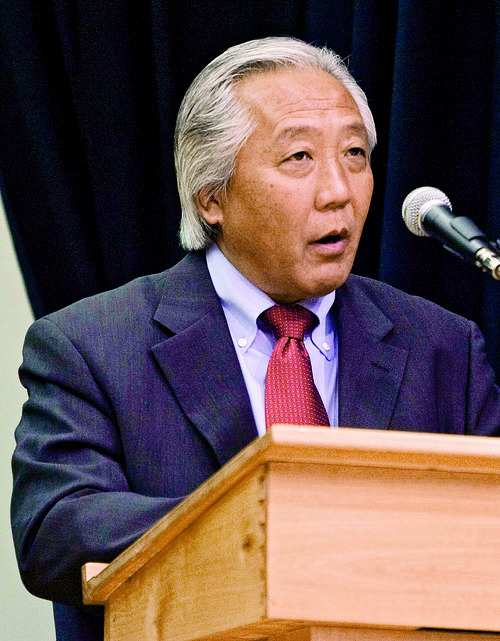This is an archived article that was published on sltrib.com in 2010, and information in the article may be outdated. It is provided only for personal research purposes and may not be reprinted.
Opponents of a potential amendment to the Utah Constitution that would end affirmative action warned Thursday that it could doom outreach programs aimed at recruiting women and minorities to attend college, enroll in education programs or enter careers in which they are underrepresented.
After California enacted a similar ban in 1997, programs that encouraged minority-owned businesses to bid for projects, offered early education to American Indian children, and provided a summer program and pre-college outreach to minority and low-income students had to be eliminated or amended, said Marina Lowe, an attorney representing the Utah chapter of the American Civil Liberties Union.
"Why are we amending our constitution to create the sort of possibility of these similar unintended consequences here in Utah?" Lowe asked the state's Constitutional Revision Commission.
Rep. Sheryl Allen, R-Bountiful, a member of the commission, said that in her talks with education officials, she had been told that the amendment could do away with math programs aimed at women and minorities, scholarship programs for minorities and English-language education.
Commission member Byron Harward, a former Republican state representative, said that while the Constitution shouldn't take sides, government should be able to reach out to underserved populations.
"If those kinds of programs get wiped out, either because of a misunderstanding of this constitutional amendment … or because this is what it is aimed at, that has a bad effect on our society," he said. "If a battered woman is someone who is afraid to go to authorities or is afraid to go to a shelter, maybe we need to go to battered women and make sure they know what resources are available."
Supporters of the amendment were invited to attend the meeting, but they were no-shows.
Retired Judge Jon Memmott, chairman of the panel established to advise the governor and Legislature on proposed constitutional amendments, said his understanding was that the proposal's backers didn't feel like the commission process was worthwhile, a suggestion that irked some members.
"I haven't seen this great body of evidence to show why we're even going down this road," said Kirk Jowers, director of the Hinckley Institute of Politics at the University of Utah. "It's either appalling or dismaying that we don't have someone here who can help us get to that point."
Rep. Brian King, D-Salt Lake City, called the supporters' behavior, "extraordinarily obnoxious, insulting and arrogant."
"They disrespect the commission, they disrespect the Legislature, they disrespect the citizens of the state and they disrespect the constitution," he said.
Rep. Curt Oda, R-Clearfield, sponsored the amendment during the last legislative session.
Memmott said at the last CRC meeting that he had been told by Senate President Michael Waddoups that Sen. Margaret Dayton, R-Orem, would sponsor the bill in the upcoming session, but Dayton has refused to discuss the prospect.
At the end of the three-hour meeting, the commission voted to study the issue further after a proposal has been introduced.
Some on the commission questioned if there was even a problem with racial or gender preferences in the state, an issue that was difficult to get a firm handle on without help from the supporters.
The Salt Lake Tribune contacted state agencies, city and local human-resources entities and several of the largest school districts, and only one — Salt Lake County — said it had a program that, in some circumstances, gave preference to underrepresented minorities.
When asked for examples of which sorts of preferential treatment his amendment was targeting, Oda refused, saying that identifying them would serve as a warning and "precipitate cover-ups."
"The intent is extremely clear," Oda said in an e-mail to the newspaper. "To ask for a specific list is only a distraction from the core issue. I can't believe you're even asking."
Sen. Ben McAdams, D-Salt Lake City, said amending the constitution is "akin to using a sledgehammer to swat a fly, but we're not sure if there's a fly."
Troy Booher, an attorney in Salt Lake City, expressed concerns about the way the proposed amendment — modeled after similar ballot measures that have been adopted in five other states — was drafted.
He said it would be more effective for the Legislature to enact a law prohibiting preferences if lawmakers believed there is a problem — and it would be simpler to fix if there were unintended consequences.
He also said the case law from the courts has increasingly been favoring a "color-blind" constitution, with recent rulings going against racial preferences.
What does affirmative action amendment say?
The constitutional amendment that failed to pass in the 2010 legislative session but is expected to return in a similar form, said, in part: Any government entity "may not discriminate against, or grant preferential treatment to, any individual or group on the basis of race, sex, color, ethnicity, or national origin with respect to public employment, public education, or public contracting."



